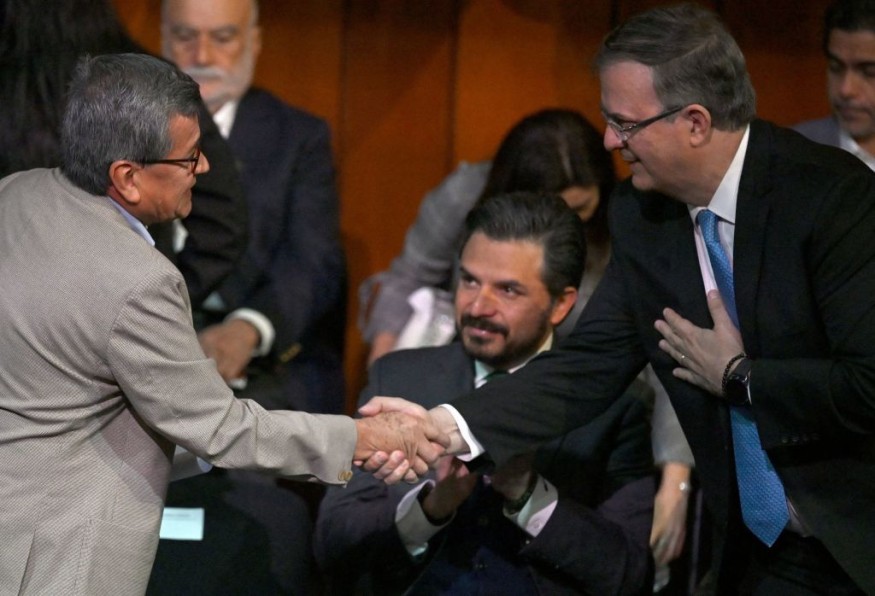Colombia Government Peace Talks with ELN Resume in Mexico Amid Tension

Peace talks between Colombia's government and the country's largest remaining rebel organization, the ELN, resumed on Monday in Mexico City to end fighting that has lasted since the 1960s.
The second round of the negotiations with the communist-inspired National Liberation Army, or ELN, began in December after Colombia's first leftist president, Gustavo Petro, took office.
Three weeks of negotiations in Venezuela's capital produced little progress, AP reports.
Due to a rebel attack on a police school in Bogota in 2019 that resulted in the deaths of 23 people, talks between the two sides were put on hold.
A representative for the Colombian government, José Otty Patio, emphasized the need for "permanent solutions ... not temporary truces" from this round of negotiations.
A "temporary, nationwide ceasefire" and "an alternative anti-drug policy that is no longer based on repression and conflict," as the rebels' main negotiator Pablo Beltrán put it, are the stated goals of the negotiations.
The ELN is a paramilitary group that has been active in Colombia since the 1960s. They have a presence in around 200 different municipalities.
Although a peace agreement was signed in 2016 with the larger Revolutionary Armed Forces of Colombia or FARC, some rural areas are still under the grip of drug gangs and rebel groups.
Peace talks with the ELN are central to Gustavo Petro's strategy to restore "complete peace" to the country of 50 million people.
Colombia Government and ELN Rebels Had Ceasefire Confusion on New Year
As a result of the ELN's denial of a truce, the Colombian government had to retract a statement it had made on New Year's Eve. On the other hand, the rebels insisted that a ceasefire was only a proposal to be discussed.
Experts are now wondering how the government's apparent error will influence the possibility of resolving decades of armed conflict in Colombia and the reliability of any prospective ceasefires in the future as the second round of talks began on Monday in the Mexican city.
"Expectations in affected communities were sky-high after [last year's] elections," which brought Gustavo Petro to power, said Kyle Johnson, co-founder of the Conflict Responses Foundation, which studies armed conflict and peacebuilding in Colombia.
"But now we're starting to see doubt," he told Al Jazeera. "Residents in militarized conflict areas ask, 'If there is a ceasefire, why are there still soldiers and tanks in my community?'"
Colombia President Gustavo Petro Promised To Negotiate Peace With Remaining ELN Rebels
Gustavo Petro, who has been in power for less than a year, has promised to fully implement a 2016 agreement with the Revolutionary Armed Forces of Colombia (FARC) and to negotiate peace or surrender accords with any remaining rebels or criminal organizations.
Former administrations' negotiations with the ELN failed due to the organization's splintered chain of command and internal dissent. Still, the ELN delegation's leader, Pablo Beltran, and top commander, Antonio Garcia, have stated that the group's fighters support the current negotiations.
Leading negotiators from both sides announced on Monday that the peace talks would center on a mutually agreed-upon cessation of hostilities and arrangements for sending relief to the regions of Colombia most affected by the conflict.
"Agreements are to be fulfilled... we have to produce results," said Otty Patiño, head of the Colombian government delegation.
The long-running battle on drugs, the war on terrorism, and social inequality were among the group's main issues, which Beltran outlined.
"The economy and the state must be placed at the service of society," he said. "This is the main change for which we fight so that there is peace with justice."
READ MORE : Jair Bolsonaro Says He May Return Home
This article is owned by Latin Post.
Written by: Bert Hoover
WATCH: Colombia, ELN rebels conclude first round of 'successful' talks - From Al Jazeera English
Subscribe to Latin Post!
Sign up for our free newsletter for the Latest coverage!

















